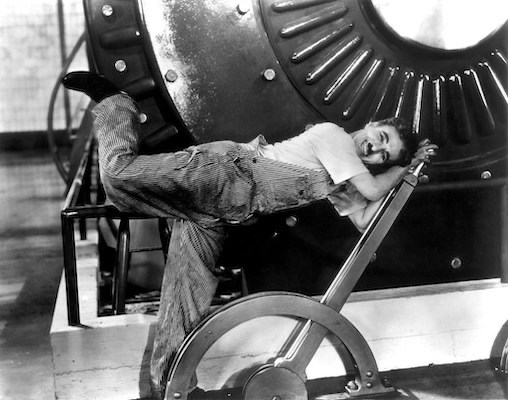by STEVEN STOLL

On Working and Being in Modern Times
Modern Times, directed by Charlie Chaplin, was released in 1936, in the depths of the Great Depression. It opens with a clock marking the beginning of the working day and a sentence: “A story of industry, of individual enterprise—humanity crusading in the pursuit of happiness.” Stampeding sheep dissolve into men entering a factory, punching in, taking their places. The president of the Electro Steel Corporation orders a subordinate through a screen—“Section 5, speed her up, 4-1!” In the film that follows, no one achieves happiness, and no one rewards the industry or enterprise of a working-class couple fighting merely to stay alive and out of jail.
Modern Times makes an argument about dignity in the midst of denigration that resonates today.
At a time when some predict that the economic fallout of the coronavirus pandemic could leave many unemployed for months or years, and when the working-class already endures the worst of everything, in a rolling crisis of despair, Modern Times doesn’t look like an excavated relic but a message from the dawn of the American Century to its dusk. The story of the Worker, played by Chaplin, and his homeless partner, the Gamin, played by Paulette Goddard, depicts alienation from and disillusionment with capitalism, law enforcement, and the world of industrial work that had failed the working class.
Chaplin wears the same mustache, bowler hat, and tight-fitting coat that he introduced in 1914 as the Tramp, now living in a far harsher world. New Deal programs provided income and work to mitigate the financial collapse, but union drives exposed a more longstanding conflict between labor and capital. In 1934 alone, a series of spectacular strikes escalated into violence between workers and police, including the Minneapolis General Strike, the Westcoast Longshore Strike, and a street battle between autoworkers and the Ohio National Guard in Toledo. Modern Times suggests the structural relationships that produced violence, the alienation, cruelty, and impoverishment that seemed endemic to working-class life in the United States.
The despair that drove workers to defend themselves is the constant, weary theme of Modern Times. Worker and Gamin need all the enterprise and industry they can bring forth just to survive modern times. Watching the film again, I thought of a book by another social critic written ninety-two years earlier.
Chaplin could not have read it. Karl Marx’s Economic and Philosophic Manuscripts of 1844 wasn’t published until 1932 and not in English until 1960. It’s a series of notes in which the twenty-six year old philosopher jotted down his first thoughts about life and labor and what it means to be human in a moment of furious change.
In these notes, Marx also grappled with his greatest inspiration, Georg Wilhelm Friedrich Hegel. After arriving at what is now Humboldt University of Berlin in 1836, Marx spent a good deal of time arguing in cafés with other young Hegelians. Most wrote about people as purely intellectual or spiritual, as Hegel did. But Marx begins with man as animal. “Man is directly a natural being,” he wrote. “As a natural being and as a … natural, corporeal, sensuous, objective being he is a suffering, conditioned and limited creature.” He also rejected the version of human nature promoted by Adam Smith and John Stuart Mill, which defined humans as inherently profit-seeking—assuming the very thing that, Marx believed, needed to be explained.
Marx called his version of human nature species being. He looked past transient qualities acquired by living in a society to timeless, essential things: food and home, love and companionship, meaningful work and a little fun. Humans who lived in industrial societies gained food and home from the money they earned by working. But what happened when the industrial division of labor failed to meet these needs? What happened when work undermined love and fun?
Modern Times meditates on these questions. It’s really about species being—our fundamental needs, our drive not to be dehumanized, the survival of our spirits as well as our bodies, the full expression of this limited creature.
Monthly Review Online for more
